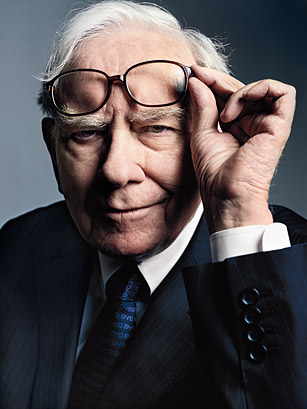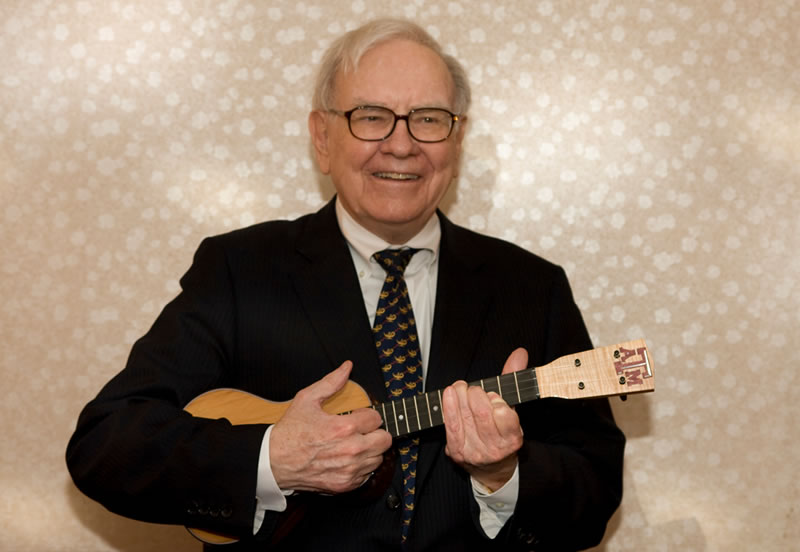Di you know that if you invested $10,000 in Buffett’s Berkshire Hathaway in 1965 (when buffett took over) that investment would be worth over $35 million today?
Whether you admire him or not, the man certainly knows what he’s doing when it comes to investing.
Coming from the Benjamin Graham style of value investing. The core of Warren Buffett’s value investing strategy is to look for undervalued investments — a subtly different goal than most investors, who look for investments where the price will rise. Buffett doesn’t care what the market will think about the stock he buys. He cares how well the company behind it will do as a business.
Buffett seeks, not a capital gain, but ownership in quality companies capable of generating solid earnings.
Buffett’s attitude to his shareholders is similar. The ones he likes most are the shareholders that intend to hold shares of Berkshire Hathaway (Buffett’s company) until they die, and then pass it on. Buffet’s spoken of hoping he’ll get shareholders that buy Berkshire the same way they buy a farm or an apartment house — with no idea of selling it. To him, everything is a partnership.
There are no contracts when Warren Buffett buys a business. He’s said the job of the seller is to forget that they sold it the day after the deal is done, and then keep running the business. The seller should be someone who loves the business for itself, not someone who wants to make some money and get out. In exchange, Buffett gives them considerable freedom, with no bureaucracy to deal with… and a promise that (barring serious cash flow problems and labor disputes) he won’t sell them off.

How Warren Buffett Picks Good People — And What He Expects From Them
Buying a business, Buffett looks for three qualities in the business’ management: integrity, intelligence, and energy. All three. Why? As he put it, “if they don’t have the first, you want them to be dumb and lazy.” And he backs this philosophy up with teeth.
Uncommonly for an empire builder, Buffett maintains a squeaky-clean and surprisingly public profile. He’s publicly told the managers of his many companies to allow nothing they wouldn’t be fine with seeing on the front page of a national newspaper.
The Warren Buffett Valuation Guide
Traditional valuations are based on multiple of earnings whereas buffett takes a different approach.
Value. The cornerstone of Buffett’s strategy is finding companies whose selling at a discount to their real value.
The big challenge here is that the investor has to determine intrinsic value, which is written in no filing and calculated from no metric. To pull this off, he looks at fundamentals — earnings, revenue, and the intangibles — and compare his estimated value to the current market capitalization. Price-book ratio, price-earnings ratio, return on equity, and dividend yield are all key.
Buffett’s Little-Understood Advantage — Avoiding Banks
Insurance is the core of Warren Buffet’s business. It’s not just the likely origin of his very long-term thinking, it contains a unique feature that few people understand. (Even though Buffett mentions it in all his annual reports.) Insurance contains a built-in source of free cash — “float.” There’s a gap between when companies take in money as premiums and pay them out in claims. This means Berkshire Hathaway has a very low cost and low-risk source of leverage compared to other investors. Buffett can borrow from the insurance companies he owns instead of having to take a loan out from a bank like everyone else. This end-run around traditional finance means he can own a lot more than his traditional equity capital would allow.
By comparison, Buffett hates debt. He looks for firms with an excellent debt-to-equity ratio when buying. He and his partner Charlie Munger structured Berkshire to ensure the company will never be in a position to depend on the kindness of strangers. “too big to fail” is not part of their backup plan. They set every deal up so that their cash requirements are much less than their total liquidity. The result? When the financial system crashed, they supplied $15 billion worth of liquidity where it was most needed… and profited handsomely.

No Commodities
You’d be hard-pressed to find a conventional commodities firm in Berkshire’s portfolio. When investing, Buffett looks for companies with unique products and a competitive advantage (“economic moat”) that will keep them at the top of their markets for a long time to come.
Buffett recently made comment about the rising Gold prices and why he sees no intrinsic value in Gold.
Why He Dislikes the Internet
Are you thinking of starting a blog to make you some cash on the side ? Well that isn’t how buffet thinks. Buffett has publicly shunned the internet all throughout his investing career.
He famously invests only in businesses that he understands. Most tech companies are off-limits. As he once put it, the auto, aircraft, and TV industries would have been easy choices for dramatic growth when they were young… but their futures included competitive dynamics that decimated many and left the survivors badly bleeding.
Instead, Buffett looks for companies with a high (and increasing) profit margin that have nevertheless been around for a while (at least 10 years), meaning they’ve stood the test of time.
Victory is Playing the Long Game
Warren Buffett is one of the world’s richest men, and he doesn’t spend it. He seems to be driven just by the love of watching the numbers get bigger and bigger. The man spends his days reading and thinking about making money — a sort of capitalist monk. When he dies, almost his entire fortune will go to charity. Yet his focus (despite his old age) is still very long term.
In 2008 Buffett made one of his largest purchases ever when bought the largest US freight railroad. Railroads are not a conventional high-growth business. Instead, they’re a very efficient way to move things, and much more so than cars. This put the largest artery of the US economy under his control. His other big capital-intensive business is currently investing billions of its earnings in wind and solar energy.
Yes — one of Buffett’s largest ever purchases happened as the market was about to crash. The man likes to bet on things going down. “When the market plummets… it’s good news for Berkshire,” as he put it. Explaining his investment in IBM to his shareholders, he pointed out that the best thing that could happen was that IBM’s stock tanks in the years before the company buys-back its stock. Why? That way, the company could buy-back more and the remaining shareholders (Berkshire) would find themselves owning a greater percentage of the firm. The whole point of Buffett’s strategy is to hope his purchases happen when things are below market value.
Investing for Troubled Times — Buffett Style
When it looks like things are just getting worse, Buffett doesn’t recommend the usual safe havens of cash securities (like bonds) or gold. To him, they’re sterile. Instead, he believes in owning businesses like farms, real estate, or universally popular manufacturers (like Coke). Because they produce something of value, they’re both much safer and much more likely to outperform cash- and scarcity-based investments like gold.
Most people see risk as the odds that the price will tank. Buffett takes a more nuanced view — his idea of risk is the probability that a given investment will cause its owner to lose purchasing power over the given holding period. This comes from Warren Buffett’s definition of investing — forgoing consumption now in order to get the ability to consume more later.
Homes are a great example of the man’s troubled-times strategy. His one investment in housing is a manufactured-home company, which makes a point of getting people in houses they can afford and often writing the mortgages too. It’s essentially a bet that two things will stay constant: people not having a lot of money for real estate, and regular lenders not being willing to take care of even those meager needs. Buffett made this bet long before the current situation.